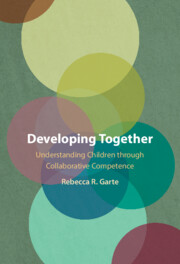Book contents
- Developing Together
- Developing Together
- Copyright page
- Dedication
- Contents
- Figures
- Tables
- Preface
- Acknowledgments
- Part I Collaborative Competence
- Part II Elements of Collaborative Competence
- Part III A New Theory and Method for Assessing Development via Collaborative Competence
- Part IV Implications for Theory, Research, and Practice
- Chapter 11 Making the Shift to Interactivity in Education and Psychology
- Chapter 12 A Theoretical Home for the Role of Collaborative Competence in Education
- References
- Index
Chapter 11 - Making the Shift to Interactivity in Education and Psychology
from Part IV - Implications for Theory, Research, and Practice
Published online by Cambridge University Press: 07 May 2024
- Developing Together
- Developing Together
- Copyright page
- Dedication
- Contents
- Figures
- Tables
- Preface
- Acknowledgments
- Part I Collaborative Competence
- Part II Elements of Collaborative Competence
- Part III A New Theory and Method for Assessing Development via Collaborative Competence
- Part IV Implications for Theory, Research, and Practice
- Chapter 11 Making the Shift to Interactivity in Education and Psychology
- Chapter 12 A Theoretical Home for the Role of Collaborative Competence in Education
- References
- Index
Summary
This chapter summarizes the evidence provided in the previous chapters that Anglo-European developmental psychology and education have been limited by a pervasive bias toward individualism. This is despite the focus of international educational assessment bodies on collaborative skills as being necessary for all students. The result of this has been a lack of robust findings, especially regarding social development, and an education system that is largely ineffective for students who are not from Anglo-European backgrounds. Addressing these related issues requires a shift in educational practice and policy toward collective achievement and collaborative forms of pedagogy. The chapter recommends the first steps toward moving education away from an individualistic paradigm. These include changing the unit of analysis from the individual to the interaction, creating group-level outcome variables, and restructuring learning environments. Multiple levels of schooling – the curriculum, instructional designs, the structure of schools, policy, assessment, and teacher training – are all discussed in terms of how they would need to shift to support collaborative competence as a goal for all children.
Keywords
- Type
- Chapter
- Information
- Developing TogetherUnderstanding Children through Collaborative Competence, pp. 209 - 220Publisher: Cambridge University PressPrint publication year: 2024



